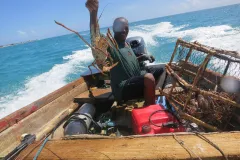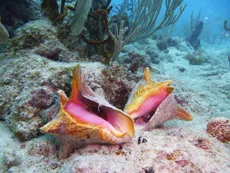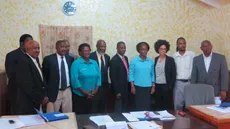The Blue Halo – Barbuda and Beyond

Papa Joe, the oldest fisherman on the Caribbean island of Barbuda, remembers when he could harvest conch in water shallower than his knees and when fish and lobsters were so abundant that fishermen did not have to go far from shore to find them.
But for many years, life has been getting harder for the island’s fishers. Lobsters and fish are smaller and scarcer, forcing fishers to venture further out to sea in more dangerous conditions to catch fewer fish. To make matters worse, poachers descended on Barbuda’s waters and added more fishing pressure on the already-depleted resources.
Years of overfishing have severely impacted Barbuda’s fragile coastal and ocean ecosystems. Degraded reefs are smothered with algae, and stocks of formerly abundant fish (especially groupers and snappers)—a mainstay of community food security and the Barbudan economy—have plummeted. According to a 2013 scientific assessment (PDF) organized by the Waitt Institute, Barbuda’s coral cover average is a mere 2.6 percent, much lower than the Caribbean average of 17 percent (PDF). With fewer fish munching on it, algae now covers roughly 79 percent of the reef and smothers coral polyps that need sunlight. Algae, along with the low coral cover, make Barbuda’s crucial coral habitat vulnerable.
In 2012, the Blue Halo Barbuda initiative was launched as a partnership between the government of Barbuda and the Waitt Institute to envision, design, and implement a sustainable ocean management plan. Working closely with the community and the Waitt Institute team, the government developed and signed into law in 2014 new regulations aimed to restore and protect its coastal waters.
The new laws aim not only to restore Barbuda’s coast, but also to ensure its health for the future. They are based on science, but just as strongly on community input. Seventeen community consultations and comprehensive scientific research resulted in an ocean management plan that directly responds to the necessary balance between scientific recommendations and the needs of the community.
Thanks to this effort, the island’s coastal waters have been zoned, parrotfish and urchins are protected, and 33 percent of the island’s coastal areas have been designated as marine sanctuaries. The government clearly defined areas open for fishing, diving, and other human activities to minimize environmental impacts and simultaneously allow for the needs of the island community. The regulations were based on scientific evidence that protected areas are able to restore themselves from degraded conditions, with increases in fish size and density, the return of sharks and other essential species to these areas, and coral reef recovery being just some of the positive outcomes.
With these new laws in place, Barbudans are hard at work on implementation and enforcement. Through education and outreach, the Blue Halo Initiative is dedicated to making ocean conservation a priority for all community members. It will take time and additional scientific assessment to determine how well fish stocks and reefs recover. Nevertheless, the reorganization of the coastal management system is an important success in itself, and an inspirational example for others working to reduce threats to the ocean.
Blue Halo’s success in Barbuda led the Waitt Institute to use this model in other areas of the Caribbean. The Waitt Institute is now working with the islands of Montserrat and Curaçao to develop similar programs to restore and protect their marine environments. Hopefully in the future, regulations that support effective management like those of Barbuda will be in place throughout the Caribbean and around the world.



